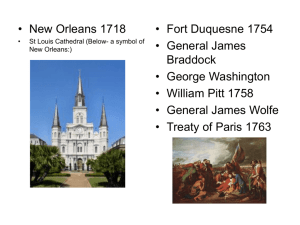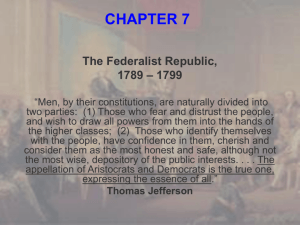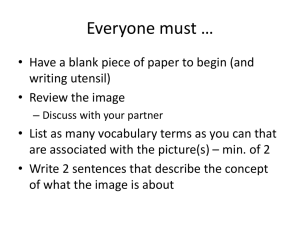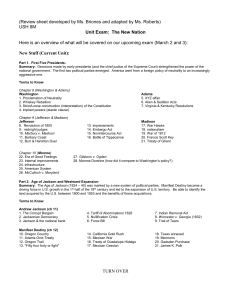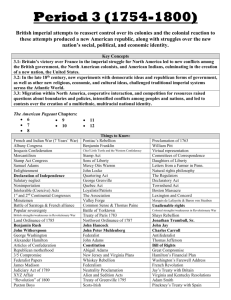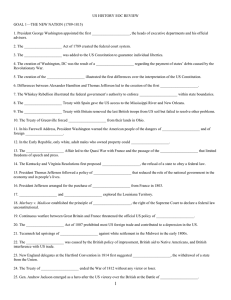1776-1860 (Ch.9-15)
advertisement
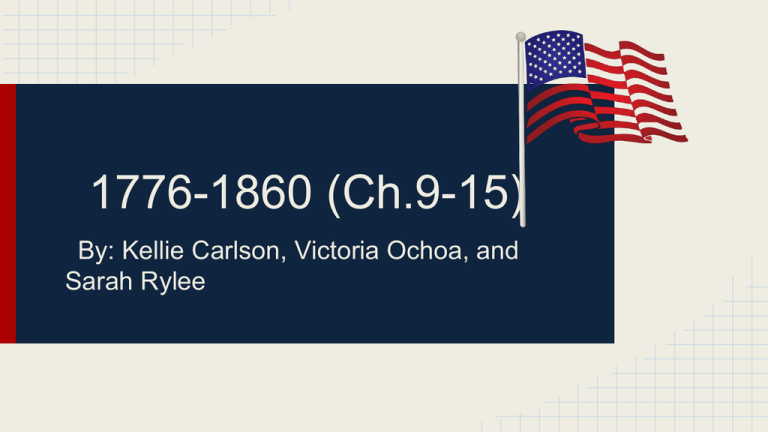
1776-1860 (Ch.9-15) By: Kellie Carlson, Victoria Ochoa, and Sarah Rylee Presidents: 1776-1860 George Washington 1789-1797 1. Platform: Not being king, avoid war and entangling alliances 2. Known For: 1st president to serve under the United States Constitution 3. Party: Federalist John Adams 1797-1801 1. Platform: Avoid war and entangling alliances. 2. Known for: Avoiding war with France. 3. Party: Federalist Thomas Jefferson 1801-1809 1. Platform: Wanted smaller military and states rights. 2. Known for: Louisiana Purchase 3. Party: Democratic Republican James Madison 1809-1817 1. Platform: A war would restore confidence in the strength of the Republic. 2. Known for: War of 1812 3. Party: Democratic Republican James Monroe 1817-1825 1. Platform: Henry Clay’s American system, Henry Clays 3 pronged system to promote industry. A strong Banking System, a protective tariff, federally funded transportation network 2. Known for: Monroe Doctrine, proclaimed that the Americas should be closed to future European colonization and free from European interference in sovereign countries' affairs. It further stated the United States' intention to stay neutral in European wars 3. Party: Democratic Republican John Quincy Adams 1825-1829 1. Platform: Nationalism 2. Known for: Corrupt Bargain, a political scandal that arose when the Speaker of the House, Henry Clay, allegedly met with John Quincy Adams before the House election to break a deadlock. Adams was elected president against the popular vote and Clay was named Secretary of State. The person that lost the election as a result of this event was the popular war hero, Andrew Jackson. 3. Party: Democratic Republican Andrew Jackson 1829-1837 1. Platform: Champion of the common man, war hero, “Old Hickory” 2. Known for: Trail of Tears, which was the forced movement of Cherokee Indians in 1838 to the land west of the Mississippi River. Lasted 1,000 miles and 116 days. Many Indians died along the way. 3. Party: Democrat Martin van Buren 1837-1841 1. Platform: Old Kinderhook (knock-off Jackson) 2. Known for: Panic of 1897, which was when Jackson was president, many state banks received government money that had been withdrawn from the Bank of the U.S. These banks issued paper money and financed wild speculation, especially in federal lands. Jackson issued the Specie Circular to force the payment for federal lands with gold or silver. Many state banks collapsed as a result. A panic ensued (1837). Bank of the U.S. failed, cotton prices fell, businesses went bankrupt, and there was widespread unemployment and distress. It was short-lived and reduced the pressure on the economy 3. Party: Democrat William Henry Harrison: March 4, 1841 – April 4, 1841 1. Platform:War Hero after fighting Indian forces at the Battle of Tippecanoe in 1811. 2. Known for: dying within thirty two days. Good job, Harrison. 3. Party: Whig John Tyler: 1841-1845 1. Platform (initial platform): William Henry Harrison died.Served under the Whig party, but he refuted many Whig policies and was rejected from the Party. Used the annexation of Texas as his new party platform. 2. Known for: Man without a party 3. Party: Whig Anti-Federalists vs. Federalists Anti-Federalists • • • • Samuel Adams Patrick Henry Richard Henry Lee Supported states rights and were typically poorer than the Federalists. Federalists • • • George Washington Benjamin Franklin Usually wealthier, better educated, and controlled the press. Publications The Federalist Papers, 1787 • • • • Essays most penetrating commentary ever written about the constitution. Sold in a form of a book called “The Federalist.” Written by Alexander Hamilton, James Madison, and John Jay. Persuaded New York to ratify the Constitution. Technology Cotton Gin • • • • • Created by Eli Whitney 50 times more effective than the handpicking process (separating the seed from the cotton fiber) Revolutionized southern agriculture. Cotton became highly profitable. Both the North and the South prospered. Clipper ships • • • • Long narrow ships with towering masts and clouds of canvas. Could outrun any steamer. Sacrificed cargo space for speed. Captains hauled high value cargoes in record times. Railroad • • • • First railroad in the United States in 1828 called “The Iron Horse” Significant contribution to the economy. Fast, reliable, cheaper than canals to make. Didn’t freeze over in the winter, able to go almost anywhere. Amendments Ninth amendment • Declares that specifying certain rights shall not be construed to deny or disparage others retained by the people. Tenth amendment • • Reserves all rights not explicitly delegated or prohibited by the federal constitution to the states respectively or to the people Preserved strong central government while specifying protection for minorities and individual liberties. Twelfth amendment • Removed the inharmonious two party combination in the future, 1804 Social Ideologies Post Revolutionary War • • • • People began to shun the idea of aristocracy and demanded equal respect. Titles such as “Mr.” and “Mrs.”, which were once reserved for the elite, were now used for the common man, too Egalitarian sentiment Anti-British sentiment (but a little bit pro- during the Articles of Confederation…) Separation of church and state Post Revolutionary War Part 2 • • • • • Civic Virtue:democracy depends on unselfish commitment of every citizen (hm...where else would we see this sentiment in American history?) Republican Motherhood: elevated women to a new prestigious role as special keepers of the nation’s conscience Cult of Domesticity- cultural creed that praised the customary functions of a homemaker, women's roles changed, families became more close-knit Isolationism- remaining apart from the affairs or interests of other groups Era of Good Feelings- used to describe the administrations of Monroe Leading up to the Civil War • • Keep black people “in their places” led to stricter rules emphasized (Haiti’s slave rebellion helped to culminate this mindset) Poor white people (and most white people, let’s be honest here) were against the liberation of slaves, despite the Quakers ardent protests Wars and Treaties Treaties • • • • • • • Franco-American Alliance (1778)- a “forever” bond to the United States to help the French defend West Indies Treaty of Ghent (written by John Quincy Adams)- U.S. and Britain agreed to stop fighting and give back land Rush-Bagot Agreement 1817- restricted naval armament on lakes Treaty of 1818- secured fishing rights for U.S. fishermen along Newfoundland and Labrador, provided joint control of Oregon territory and marked the beginning of better relations between Britain and U.S. Florida-Purchase Treaty of 1819 (Adams-Onis)- Spain sold Florida to the U.S. and the U.S. gave up its claims to Texas giving the American southwest to Spain Russo-American Treaty of 1824-Set the southern borders of Russian holdings in America at the line of 54 degrees 40, the southern tip of Alaska Treaties with Native Americans- U.S. tried to create peace and “civilizing” attempts by trying to create a government. Wars • • • • Miami War (1790-1791)- Indians in Miami Confederacy excited by the British who were upset by peace treaty for fur trade. The confederacy of 8 nations defeated armies led by Generals Josiah Harmar and Author St.Clair. War with Britain (1812)- When Britain did not revoke Orders of Council (if they did so then Napoleon would repeal the restrictions on France) U.S. placed an embargo on Britain, which ended neutrality and was an act of war. Also Madison’s motives for war included the British arming of hostiles, and to restore confidence in republican experiment. War showed Europe that U.S. would stand up for itself. Black Hawk War- War between the Sequoyah and Cherokees The Bank War (1832)- Bank charter vs. Jackson and Jackson vetoed for pet banks against Clay’s plan. Fetus wars (A.K.A. battles) • • • Battle of Fallen Timbers (1794)- “Mad Anthony” Wayne caught the Miami Confederacy and got a peace agreement when British refused to help. Battle of Tippecanoe- Tecumseh (indian who welded together confederacy of all tribes east of the Mississippi) left the Prophet (indian who helped Tecumseh) to get recruits and the Prophet was attacked and the settlement was burned. Battle of the Thames- won by U.S. under General Harrison Other important information • • • • • Constitution- contract defined the powers of the government and drew authority from the people also includes fundamental laws with the bill of rights, liberties, and annual election of legislatures. State Constitutions- colonies drafted new states with the authority on the people Articles of Confederation (march 1, 1781)- received a unanimous approval and was in place until Constitutional Convention in 1786 Land Ordinance of 1785- provided acreage that should be sold for Northwest and proceeds went to pay debts. Also 16th section was sold to benefit public schools Land Ordinance of 1787- governing of old northwest, with 60,000 inhabitants the state will become approved by congress Foreign Policy Increased Foreign Pressure ● Britain had resentment toward the U.S. when they declined to make a commercial treaty or repeal Navigation Laws. ● Spain begins to become unfriendly and in 1784 they closed the Mississippi to American commerce. ● France demanded repayment of loans and restricted trade with the West Indies and other parts of the world. ● North African pirates ravaged America’s mediterranean commerce and enslaved sailors. The U.S. sent in the army and navy to make it safer for American sailors. ● Franco-American Alliance ● Jay’s Treaty (British evacuate U.S. soil) ● XYZ affair where U.S. secretly sent 3 ambassadors to France Foreign Policies ● Alien Acts- allowed people into the country but set in place rules. ● The Louisiana Purchase- in 1803 delegates were sent to France to buy New Orleans and Napoleon decides to abandon his New World empire and sold it to the U.S. for about 4 cents an acre or $15 million. ● U.S. then created an illusion of isolationism and increased immigration flared up antiforeignism in nativists Supreme Court Decisions Supreme Court Cases ● Marbury vs. Madison ○ Established judicial review where the supreme court has last word on the constitutionality of something. ● McCullough vs. Maryland (1819) ○ Maryland can’t tax the bank of U.S. Marshall used jurisdiction over law. “the power to tax is the power to destroy” ● Cohens vs. Virginia (1821) ○ Supreme Court’s right to review state supreme court decisions in criminal law matters. ● Gibbons vs. Ogden (1824) ○ State may not legislate inconsistent with federal law. More Supreme Court Cases ● Fletcher vs. Peck (1810) ○ State did not have the constitutional authority to revoke a corrupt land sale. ● Dartmouth College vs. Woodward (1819) ○ Allowed the supreme court to invalidate a state law and restrict a state legislature THE END!

